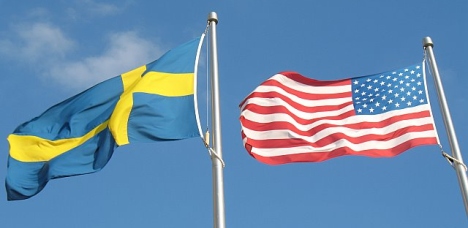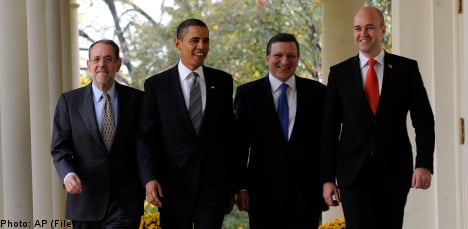A total of 67 percent of Swedes reported having a positive view of the United States, compared with only 64 percent saying they have a favourable opinion of the EU.
The figures come from the 2012 Transatlantic Trends Survey carried out by the German Marshall Fund of the United States, the results of which were published on Monday.
The findings also revealed that, aside from Turkey, Sweden the lowest opinion of Israel, with 68 percent of Swedes registering a negative opinion of the country.
“That’s something that is very serious and which I think we need to consider,” Anna Jardfelt, head of the Swedish Institute of International Affairs (Utrikespolitiska institutet), told the TT news agency.
She added that the numbers don’t necessarily point to underlying anti-Semitism among Swedes, theorizing instead that the results may have something to do with Sweden’s relationship with Israel or the conflict in the Middle East.
The report also found that a majority of Swedes believed recent military interventions in Iraq, Afghanistan, and Libya were the right thing to do.
The Transatlantic Trends report found that 56 percent of Swedes think the 2003 invasion of Iraq was the right thing to do, while 62 percent felt the same way about the intervention in Afghanistan.
In the case of Libya, 68 percent of Swedes thought the recent military campaign was the right thing to do, the highest figure reported in all of the countries polled in the study.
And while 48 percent of Swedes are against military intervention in Syria, 44 percent were positive toward sending troops, a figure second only to France (45 percent) among those countries polled.
“These are rather special figures we see for Sweden,” said Jardfelt.
The report also found that Swedes have the most negative view of Russia among the countries included in the report, which was based on responses from 12 EU member states, Russia, Turkey, and the United States.
Only 23 percent of Swedes have a positive view of Russia, compared to 32 percent of Germans.
Swedes were also among those with the most critical views of China, with only 34 percent registering a positive opinion of the country.
Swedes’ scepticism toward the common European currency was evidenced as well, with 84 percent of Swedes saying that the euro had a negative impact on their economy, a 17 percent increase from results of the 2011 Transaltantic Trends report.
Nevertheless, Swedes remained largely satisfied the way that finance minister Anders Borg and the government have handled the economic crisis, with 74 percent approving of how the crisis was managed, the highest figure recorded for any country in the study.
When it comes to US presidential politics, 71 percent of Swedes said they approved of US president Barack Obama’s management of international policies and 79 percent would vote for him if they could in the upcoming US elections.
However, Republican challenger Mitt Romney has considerably less support among Swedes: only 4 percent would vote for him, among the lowest figures recorded in the report.
The Transatlantic Trends report is an annual survey of US and European public opinion and is based on responses gathered by the TNS Opinion polling firm in June 2012.
Sweden was included in the survey for the first time in 2011, with Russia being added for the first time this year. Other EU member states included in the study are Bulgaria, France, Germany, Italy, the Netherlands, Poland, Portugal, Romania, Slovakia, Spain, and the United Kingdom.
TT/The Local/dl



 Please whitelist us to continue reading.
Please whitelist us to continue reading.
Member comments